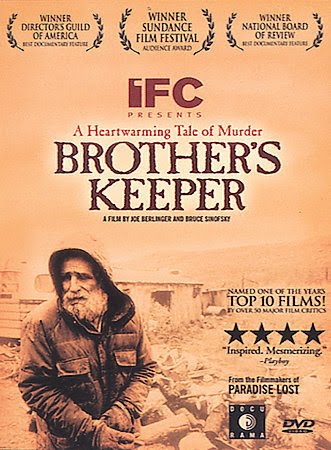
This past month saw the deaths of two prominent documentary filmmakers, Bruce Sinofsky and Albert Maysles, who happened to pass away within two weeks of each other. Sinofsky’s lifelong filmmaking partner was Joe Berlinger and the duo was best known for the Paradise Lost trilogy, which chronicled the controversial West Memphis Three murder case. For years, Albert Maysles teamed up with his brother, David, to delver such iconic documentaries as Gimme Shelter and Grey Gardens. The Maysles brothers helped popularize the “direct cinema” style of documentary filmmaking. Their films were often made with a “fly on the wall” perspective, as the directors would simply stand back and observe their subjects with the camera, giving their stories more authenticity and realism. What connects these two duos is that Berlinger and Sinofsky actually started off their careers as employees at the Maysles brothers’ production company and used the experience to hone their craft as filmmakers. In the early nineties, Berlinger and Sinofsky finally got the opportunity to direct their first feature-length documentary, Brother’s Keeper. Like the Paradise Lost trilogy, Brother’s Keeper chronicles a controversial murder case in which a seemingly innocent person is being railroaded for a crime they did not commit. However, in both films, the community’s reaction to the accused could not be more different.
https://www.youtube.com/watch?v=Rjavwg9ljNU
Brother’s Keeper takes place in Munnsville, a rural farming community in upstate New York with a population of approximately 500 people. The subjects of this story are the Ward brothers: 59-year old Delbert, 64-year old William, 62-year old Lyman and 70-year old Roscoe. The brothers all work on a dairy film and live together in a dilapidated two-room shack. They have no formal education, a complete disregard for personal hygiene, and very few social skills. Even though the community believe that the Ward brothers are harmless, they don’t exactly go out of their way to associate with them. However, things take a dramatic return when William is found dead in his bed one morning. Since William had been ill for quite some time, the death is initially believed to be nothing more than natural causes, but the community receives a major shock when Delbert is charged with his brother’s murder. While being interrogated, Delbert signs a confession to the crime and the prosecution’s theory is that he smothered William to death as a mercy killing to put him out of his misery. Once the mainstream media becomes involved and the case draws the attention of famous figures like Connie Chung, the story grows even more sensational, with allegations that Delbert and William had an incestuous relationship and that the murder was a sex crime. Of course, the murder charge is very controversial, as Delbert is illiterate and likely signed his so-called “confession” without even knowing what it was.
The most fascinating aspect of Brother’s Keeper is the community’s reaction to Delbert’s arrest. In case you’re not familiar with the filmmakers’ Paradise Lost trilogy, it chronicled an infamous murder case in West Memphis, Arkansas, where three children were murdered and three local teenagers (a.k.a. the West Memphis Three) were convicted of the crime. Since the accused teens were known for being rebellious outsiders who did not fit in with the conservative, religious community, the whole town instantly condemned the West Memphis Three as being guilty before their trial even started. By contrast, even though the four Ward brothers did not exactly fit in with the community of Munnsville, the town’s residents rally around Delbert and believe in his innocence without hesitation. They immediately pool together the necessary funds for Delbert’s bail and show their unwavering support by raising money for his legal defence. Indeed, there is no hard evidence against Delbert aside from his questionable confession. Delbert may be an eccentric oddball, but the community refuses to believe that he is capable of murder. They have no tolerance for one of their own having his constitutional rights violated because some hotshot prosecutor wants to secure a high-profile murder conviction. After this case drew the attention of the national media, Joe Berlinger and Bruce Sinofsky decided to travel to Munnsville and spend a year filming a documentary about this very unique community.
The two filmmakers decided to follow their mentors’ “direct cinema” approach when they made Brother’s Keeper, as they do not interject themselves into the story. Instead, they simply fade into the background and allow their documentary’s subjects tell the story in front of the cameras. It’s interesting to follow the progression of the Ward brothers throughout the film, as these reclusive figures become semi-celebrities who somehow adjust to having a camera follow them around. At the outset, it’s easy to assume that the Wards might be mentally challenged, but after Delbert’s case allows them the opportunity to engage in more social interaction, you realize that they are genuinely likable, good-hearted people who just have difficulty adjusting to the outside world. In fact, when Delbert develops into a more outgoing individual, his attorney actually becomes worried that this could harm his defence, which is based around him being a simpleton who did not understand the murder charge against him. However, the documentary’s trial scenes demonstrate just how taxing modern life can be for the Wards, as the ordeal of testifying on the witness stand nearly causes Delbert and his brothers to have nervous breakdowns. Like the Paradise Lost films, Brother’s Keeper functions as a compelling courtroom drama, as well as a scathing indictment of the legal system and how damaging the influence the media can be. But most of all, the film is a compelling slice-of-life examination of human nature and a unique, tight-knit community that most of us will never be familiar with.
